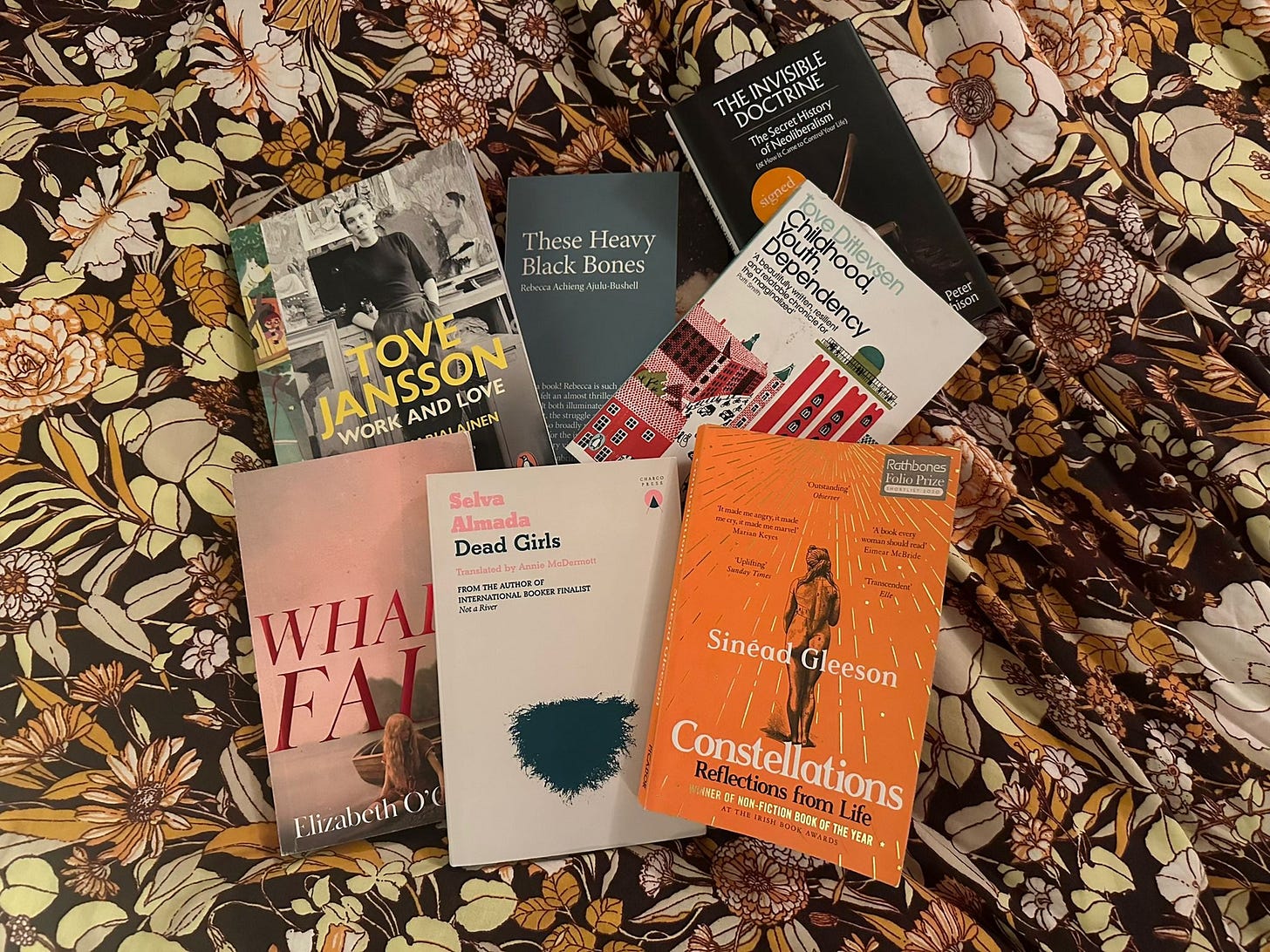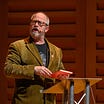The Lines I Underlined
Robin is reading lots of books. I know, it's shocking news.
I am often asked “how do you read so many books?”
And with a naivety that will bury any possible career in newspapers, I reveal the truth. It is all sleight of hand and page turning finger trickery. I open many books, excitedly sliding through sentences until a brief distraction throws me out of one book and into the middle of another . My library is a waltzer, there is a danger of motion sickness. January is always the most dizzying month as, for the first two weeks, I usually have time before the walls of my itinerary of eccentric endeavours close in,
Rather than offer critique of those I read, I thought I would share a few of the words and sentences I underlined as I read. Almost everything I read always has something within it that has the ability to change me and enhance my interpretation of the world. I don’t hang around with bland books.
“Part of the whale’s insides emerged onto the sand, petals of fat blue and mauve”
Whale Fall tells the story of a smart young woman, brought up on a Welsh island a few miles from the mainland, far enough away to be another world. Its clocks turned back a couple of decades. A whale is dead on the beach, marking the changing of days through its decay. Two academics come over from the mainland to create a book about the island and its ways through the eyes of those that romanticise the life but could never really live it.
“Llinos had always been a strange child. Her favourite activity was to collect bones from where’ve she could find them, and slowly assemble them into complete animals.”
A child after my own heart.
Jam Bookshop has had two locations in the last couple of years, near Columbia Flower market and then at Ladbroke Grove. Both locations were small and perfectly curated. David, who ran Jam (sadly past tense now) is a comic book artist and his knowledge of that world meant I would always find new treasure. His passion for books and the beauty of them beamed off every shelf. I popped in to see him on one of his last days in west London, picked up the new Charles Burns, and a couple of comic books by Tillie Walden. There, as ever, was the book I did not know existed that, at that moment of visibility, became a necessity.
“We lived atomised lives…”
Selva Amada’s Dead Girls is an investigation into the murder of three young women, and far more femicide haunts the surroundings.
“La Condorio, a mentally disabled prostitute, was found with her throat cut, wrapped in a blanket, on a piece of wasteland in the city.”
This is a book that tightens the stomach and disturbs, it is more matter of fact than graphic. It is that matter of factness that makes it so graphic. It made me thing of the work of Suzanne Lacy, who gathered Ecuadorian men into a bull ring and then they read letters from women about childhood, bodies, and domestic and gender based violence. To stand in that room, to witness the art she made from it is to be confronted by the need as a man to not be a bystander. I fear the truth is that people and companies would still rather everyone just “keep quiet and carry on”. We are not quite as far away from the Savile days as we might wish to believe, and I think much of the weight of that is on men not being so scared of being outcasts for not letting abuse just pass by.
“Her sister told her: don’t let anyone push you around. You have to make people respect you. Never let a guy lay a finger on you. If they hit you once, they’ll hit you forever.”
I will keep Selva Almada’s work close by.
(also, I recommend two Anna Kendrick films that look towards this, Woman of the Hour and Alice, Darling. It says a great deal about Anna Kendrick that she gave her fees for Woman of the Hour, which she also directed, to two charities, Rainn (the Rape, Abuse & Incest National Network) and the National Centre for Victims of Crime).
“I am only a body and nothing more, sinew, muscle, rippling brown skin taut…i forget everything that makes me worry, forget everything that makes me human.”
These Heavy Black Bones was on a shelf of proof copies. I could roam freely.
What do I know about Olympic swimming? That’s the joy of reading, when something is written well, it will ignite your mind whatever it is about.
Rebecca Achieng Ajulu-Bushell is the first black woman to swim for Britain. She was world number one. I was so engrossed in the evocative prologue that carries us into her competitive swimming state of mind and then into the start of her life story that I had to be turfed out of the long closed coffee shop. Kindly, I think the baristas turned a blind eye as they wiped and stacked as that could see I was captivated.
“I gorged on my mother’s love; it never ran out. As she poured it into me we grew up and together . I was a piece of her rib, she was my left arm.”
Tove Ditlevsen’s mother was very different.
“…I always have to keep searching for a sign of love. Everything I do, I do to please her, to make her smile, to ward off her fury.”
I am savouring her trilogy of memoirs. I keep looking up with each new startling line, desperate to share it with whoever else is on the bus.
“Childhood is long and narrow like a coffin, and you can’t get out of it on your own.”
I discovered Tove Ditlevsen quite accidentally. I saw “Tove” on the spine of a book and, being a great fan of Tove Jansson, reached up expecting to find a novel or anthology that was new to me. It was The Faces, a novel of existential anxiety and mental health battles that a children’s author struggles with (more of that another time, suffice to say, if you see it, open it).
She has the very special skill, and one that I particularly adore, as much as it can floor me, of carrying us right into the centre of the child’s mind, a perpetual, sometimes terrible, empathy.
“The body is an afterthought.”
The first sentence of Sinead Gleeson’s Constellations.
She writes of our nonchalance to the seemingly humdrum cage of us, until we suffer “a corporeal blip”.
She unpicks the banality of expectations, of what you are meant to be as a woman. Around the time that Sinead O’ Connor shook the world with her mighty voice and fierce individuality, Sinead Gleeson also shaved her head.
“…there is always a response, especially from me. They are mostly horrified, or bemused; some declare it attractive: but I was always asked to justify myself. To explain what I’d done. And why.”
So that is where I have got to in the first few days of January, two books finished, three still creating great excitement in my head.
I am also dabbling with Tuula Karjalainen’s biography of Tove Jansson and have just begun George Monbiot’s slim book on Neoliberalism,
Oh, look me in the book tower for 2025.
If you like the sound of these, and I hope you do, go to your independent bookshop. The first couple of months of the year are often toughest for them (or you can order via bookshop.org.uk) . And if you can’t afford books, get to the library. We need to support libraries as much as possible. I have always said that I have never met a cruel librarian, though I was told by one audience member that there used to be a cruel librarian in Lewisham in the 1970s who was a member of the National Front and a right bastard. Honestly though, he is the rarity that was required for us to see how wonderful the rest are.
On 23rd January I will be at The Ropetackle in Shoreham-by-Sea for a War Child benefit. On 24th January I will be in Llanelli with the brilliant Rachel Taylor Beales and then we’ll be in Narbeth on 25th.
Pre-order signed copies of Robin’s new book, out in May, from the Shambles shop now.










A good read, thanks Robin
(Just to note the caption for the Moomins reads "Tove Jansson's Moons")